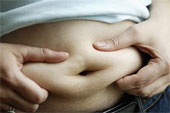Childhood obesity has serious consequences for children’s health and wellbeing.
 Health disorders: these include conditions that have in the past been diagnosed only in adults, such as type-2 diabetes and heart disease.
Health disorders: these include conditions that have in the past been diagnosed only in adults, such as type-2 diabetes and heart disease.
Emotional and social problems: these include teasing and bullying, low self-esteem, poor body image, eating disorders and depression.
Adult obesity: there are close links between adult overweight or obesity and obesity in childhood.
Physical health problems in adulthood: these include cardiovascular disease, type-2 diabetes, cancer, infertility and skin disorders.
If obesity has existed since early childhood, associated illnesses and health problems are more likely to occur in adulthood. Not all obese infants become obese children, and not all obese children become obese adults. However, the prevalence of obesity increases with age among both males and females (Lohman, 1987), and there is a greater likelihood that obesity beginning even in early childhood will persist through the life span (Epstein, Wing, Koeske, & Valoski, 1987).
The Ill Effects of Obesity
Obesity presents numerous problems for the child. In addition to increasing the risk of obesity in adulthood, childhood obesity is the leading cause of pediatric hypertension, is associated with Type II diabetes mellitus, increases the risk of coronary heart disease, increases stress on the weight-bearing joints, lowers self-esteem, and affects relationships with peers. Some authorities feel that social and psychological problems are the most significant consequences of obesity in children.
Kids who are unhappy with their weight may be more likely than average-weight kids to:
Develop unhealthy dieting habits and eating disorders, such as anorexia nervosa and bulimia
Be more prone to depression
Be at risk for substance abuse
Shortness of breath that makes exercise, sports, or any physical activity more difficult and may aggravate the symptoms or increase the chances of developing asthma
Restless or disordered sleep patterns, such as obstructive sleep apnea
Tendency to mature earlier (overweight kids may be taller and more sexually mature than their peers, raising expectations that they should act as old as they look, not as old as they are; overweight girls may have irregular menstrual cycles and fertility problems in adulthood)
Liver and gall bladder disease.
Obesity increases the risk of insulin resistance and type 2 diabetes which is normally a disease seen in later life in adults. However, increasingly children in their teens are presenting with type 2 diabetes as a consequence of being obese. There are also marked psychological effects leading to low self-
esteem.
Getting further help
If you want to discuss your child’s eating and activity habits or weight, the following professionals can provide advice and information:
Maternal and child health nurse
Local GP
Paediatrician
Community health centre
Dietician
Psychologist
Back





 Health disorders: these include conditions that have in the past been diagnosed only in adults, such as type-2 diabetes and heart disease.
Health disorders: these include conditions that have in the past been diagnosed only in adults, such as type-2 diabetes and heart disease. 